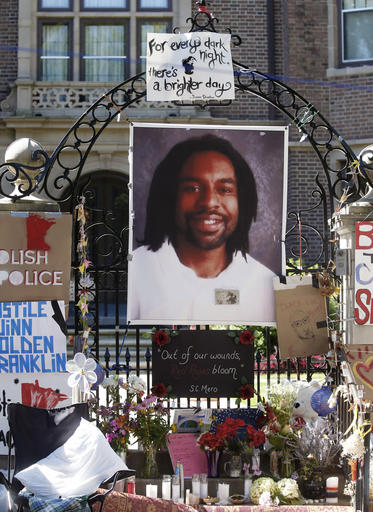A federal agency that’s reviewing a Minnesota police department after the fatal shooting of Philando Castile is kicking off its work with a series of listening sessions designed to give citizens a chance to express concerns and offer suggestions.
Representatives from the Department of Justice’s Office of Community Oriented Policing Services will be gathering community input in the three cities served by the St. Anthony Police Department this week. Here are some details:
WHY A REVIEW?
Castile, who was black, was killed July 6 during a traffic stop in the St. Paul suburb of Falcon Heights. The shooting’s gruesome aftermath was streamed live on Facebook by Castile’s girlfriend, who was in the car along with her young daughter. Prosecutors said the 32-year-old elementary school cafeteria worker was shot by St. Anthony police officer Jeronimo Yanez after he told Yanez he was armed and had a license to carry a weapon.

Yanez, who is Latino, has been charged with second-degree manslaughter and other counts. Prosecutors said he acted unreasonably and was not justified in using deadly force. Yanez’s attorneys have asked that the charges be dismissed, and said Castile never told Yanez he had a permit to carry.
Castile’s family has said he was profiled because of his race, and his death renewed concerns about how law enforcement officers interact with minorities. His death prompted numerous protests, including public outcry at city council meetings in St. Anthony and Falcon Heights, where citizens demanded police department changes.
___
WHAT WILL THE SESSIONS ENTAIL?
A listening session will be held in each city the St. Anthony Police Department serves, with the first on Monday night in Falcon Heights. Sessions will be held Tuesday in St. Anthony and Wednesday in Lauderdale.
Ronald Davis, director of the Office of Community Oriented Policing Services, said the listening sessions give his representatives a chance to hear the community — something he called “critically important” — before his office gets deep into the review process.
Davis said the community might share something that will expand the review’s scope.
The Police Department is not invited, he said.
“We want to hear from the community,” he said, later adding: “We would encourage community members to come out and share their input. There is no voice too small, too loud, and I think all of them are welcome.”
___
WHAT HAPPENS NEXT?
During the course of the review, Davis’ office will assess the Police Department in many areas, including interactions with the public, traffic stops and hiring practices. Davis has said the review will include an assessment of thousands of pages of documents, police ride-alongs and interviews before recommendations are made to improve service and build trust.
After issuing an initial report, the office will work with St. Anthony to help implement changes.
The review is different from investigations by the Justice Department’s Civil Rights Division, which result in consent decrees and mandated reforms. Davis said his office’s reviews are done by request, and departments can decide if they want to implement recommendations.
St. Anthony is the 16th police department to undergo this this type of voluntary review, and with 23 officers it is the smallest. Davis said the hope is that recommendations made here will serve as a model for small police departments across the country.
___
CHANGES ALREADY IN THE WORKS
Castile’s shooting prompted the city of St. Anthony to take a closer look at possible racial bias within the Police Department.
Arrest data analyzed by The Associated Press in the days after Castile’s death showed St. Anthony police disproportionately arrested African-Americans. Census data shows just 7 percent of residents in St. Anthony, Lauderdale and Falcon Heights are black, but black people account for roughly 38 percent of arrests since 2011.
In September, the department announced it was taking steps to enhance its data collection, including noting details such as a person’s gender, race and whether a search was conducted during a traffic stop. Police Chief Jon Mangseth said at the time that the changes build on the department’s commitment to be transparent and accountable.
In addition, the city has expressed interest in forming a task force to look into possible racial bias.
When the federal review was announced last month, Mangseth said his department welcomed the process and is committed to making necessary reforms. Some community members weren’t impressed, saying the department was only doing what was necessary to improve its image.


